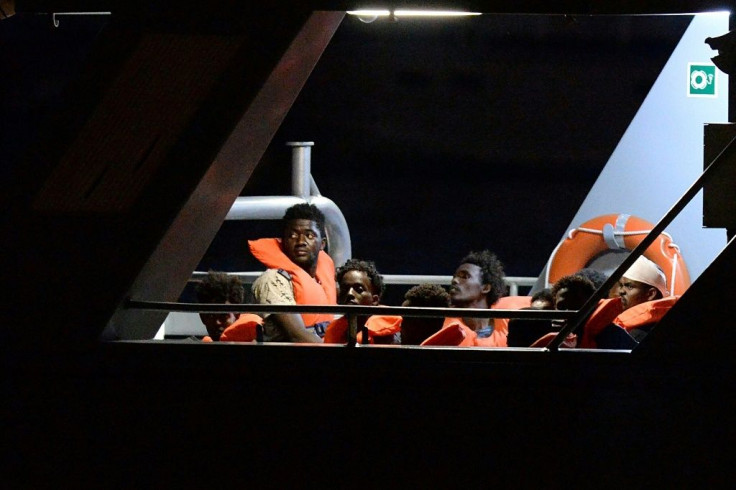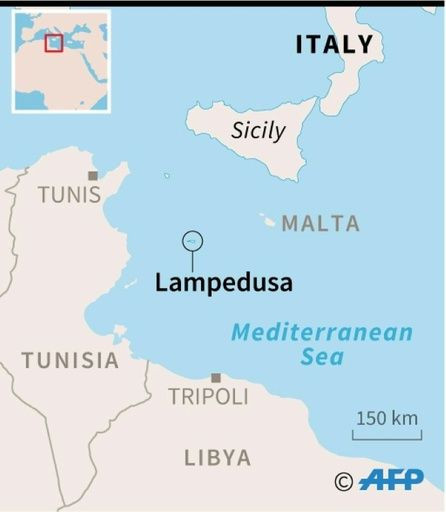EU Urged To Share Refugees As Boat Tragedies Mount

A nucleus of four EU countries was trying Tuesday to coax more reluctant member states to take a share of rescued asylum-seekers, a day after another Mediterranean migrant boat tragedy.
Germany, France, Italy and Malta were seeking support from colleagues in an EU interior ministers' meeting in Luxembourg for an agreement they worked out September 23 in Malta meant to serve as a six-month, stop-gap plan pending a long-delayed reform of the EU's asylum policy.
The meeting came after a boat packed with around 50 migrants capsized Monday off Italy's island of Lampedusa, resulting in the drowning deaths of at least 13 women, some of them pregnant.
The aim of the so-called Malta declaration is to avoid such tragedies in the future, and to find a solution for NGO rescue ships filled with migrants often being refused entry to EU waters for weeks.
"Listen to me, we cannot continue like this, with what is happening in the Mediterranean," the EU commissioner for migration, Dimitris Avramopoulos, said as he arrived for the meeting in Luxembourg.
He added, however: "We cannot try to find only ad hoc solutions, we need a permanent mechanism."
Risky crossings
The temporary agreement wants to ease the burden of first-call countries such as Italy and Malta which currently are required to host the migrants arriving by sea while their asylum cases are looked at.
Under the deal, France and Germany have volunteered to host a share of the asylum-seekers.
It also wants to find a way of breaking the business model of people-smugglers who push flimsy, overcrowded boats of migrants from North Africa headed towards Europe in the hope of rescue or landfall -- a risky bid with sometimes fatal consequences.
Monday's capsizing off Lampedusa added to a litany of migrant boat tragedies.
Since 2016, at least 19,000 migrants have drowned or gone missing while making the perilous Mediterranean crossing, according to the UN's International Organisation for Migration.

Yet some EU states are wary that the Malta declaration will act as a "pull" factor, encouraging more boat crossings.
Others argue they are already taking on a disproportionate number of asylum seekers relative to their populations.
Bulgaria, Cyprus, Denmark, Hungary and the Netherlands are opposed or extremely reluctant to join the temporary scheme, according to diplomats.
Others, including Finland, Ireland and Luxembourg, are said to be considering it, but only if a significant number of other states sign on, and as long as there are no quotas for how many migrants are taken in.
Spanish Interior Minister Fernando Grande-Marlaska said his country wanted to see the Malta accord widened to all Mediterranean crossings, which would include the short journeys from Morocco to Spain, another major migration route.
Germany prudent
German Interior Minister Horst Seehofer, on arrival, acknowledged the concerns -- and the fragility of the Malta agreement.
"If this solution ends up being abused, so that hundreds (of asylum-seekers) become thousands, then tomorrow I can say that the emergency mechanism is finished," he said.
"It was clear from the outset that there will be no decisions today," he added -- just an exchange of views and a testing to see what support the agreement has.
France's minister for European Affairs, Amelie de Montchalin, told AFP as she attended the meeting that there was a hope that other EU countries would step up on humanitarian grounds.
"We cannot solve this issue as just four countries," she said.
"We can't have countries that are resigned or indifferent in the EU. This is an issue that concerns all of us."
© Copyright AFP 2024. All rights reserved.




















